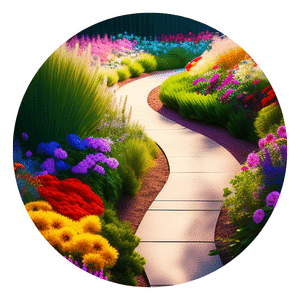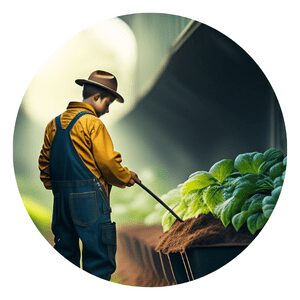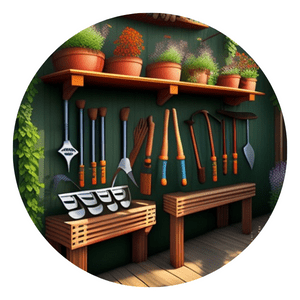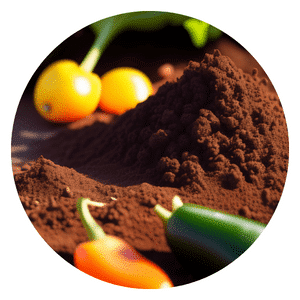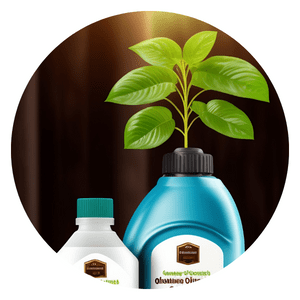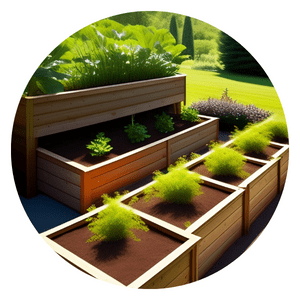How Frogs Are Beneficial to Your Garden
Frogs are often seen as slimy and unpleasant creatures that should be avoided at all costs.
However, these amphibians play a vital role in maintaining the balance of nature.
In fact, having a healthy population of frogs in your garden can be incredibly beneficial.
Not only do they add to the biodiversity of your garden, but frogs also act as natural pest controllers.
They feed on insects such as mosquitoes, flies and slugs – which can cause significant damage to plants and crops if left unchecked.
Furthermore, frogs are an indicator species – their presence is a sign that an ecosystem is healthy and functioning properly.
In this article, we’ll explore the many ways in which these little green creatures can help keep your garden thriving.
Frog Garden Menu
Natural pest control
Frogs are known for being voracious insect eaters, which makes them a great natural pest control option for gardens.
These amphibians can consume large quantities of insects such as mosquitoes, flies, slugs, and snails. This helps to keep the population of these pests in check and prevent them from causing damage to your garden.
Frogs also play an important role in maintaining the balance of your garden’s ecosystem.
They contribute to nutrient cycling by consuming dead plant matter and other organisms that would otherwise accumulate on the ground. This helps to improve soil quality and promotes healthy growth of plants.
In addition to their pest control benefits, frogs can also be a natural indicator of environmental health.
Changes in frog populations or behavior may signal issues with water quality or habitat degradation.
By providing a safe and healthy environment for frogs in your garden, you are contributing to overall ecological sustainability.
Organic pest management
Frogs are excellent natural predators for pests, making them an essential part of any garden ecosystem. They prey on insects such as mosquitos, gnats, and aphids that can damage plants in your garden.
Additionally, frogs also consume slugs and snails that can destroy garden foliage.
By attracting these amphibians to your yard with water features or suitable habitats, you’ll create a natural balance in the ecosystem without having to rely on harsh chemical pesticides.
The use of synthetic chemicals has been linked to various health problems for humans and wildlife. Therefore it is essential to explore alternative methods like organic pest management.
Frogs play a vital role in maintaining the ecological balance of your garden by consuming insect pests that would otherwise harm plant life.
Their presence can help reduce or eliminate the need for toxic chemical pesticides while promoting organic gardening practices which is not only beneficial but also eco-friendly.
Mosquito control
Frogs are not only cute and fun to watch, but they can also be incredibly beneficial to your garden.
One of the most important roles that frogs play in your outdoor space is mosquito control. These little amphibians love to eat mosquito larvae, which can help to reduce the population of these pesky insects in your yard.
By keeping the number of mosquitoes down, you can enjoy more time outside without having to worry about getting bitten or contracting a mosquito-borne illness.
In addition, frogs also eat other types of insects that can damage your plants and flowers.
If you want to encourage frogs to visit your garden, there are several things you can do.
First, create a water feature like a pond or fountain where they can live and breed.
Additionally, avoid using pesticides or other chemicals that could harm them or their food sources.
By taking these simple steps, you’ll be able to enjoy all the benefits that these amazing creatures have to offer!
Frogs in the garden, don't be afraid They help keep pests and bugs at bay With their appetite for pesky flies Your plants thrive under their watchful eyes Their croaking fills the night sky And even fertilizes with their waste nearby So invite a frog or two into your yard For a healthy garden, they'll work hard.
Chappy The Gardener
Snail and slug control
Frogs are a natural and effective way to control snails and slugs in your garden. These pesky pests can wreak havoc on plants, causing damage or even killing them.
By consuming these creatures, frogs help keep their numbers under control, reducing the amount of damage they can cause.
Not only do frogs help with pest control, but they also play a vital role in maintaining a healthy ecosystem in your garden. They provide food for other animals like birds and snakes, which can help balance the population of different species within the ecosystem.
Additionally, frogs also consume insects that may be harmful to plants or humans.
It is important to note that not all frogs will consume snails and slugs, so it is best to research which species are native to your area and attract those specific types of frogs to your garden.
Providing habitats such as ponds or water features can also encourage frog populations to thrive in your yard.
By welcoming these amphibians into your garden space, you are not only promoting biodiversity but also helping protect your plants from destructive pests.
Soil health improvement
Frogs are often overlooked in terms of their contributions to soil health improvement.
As they hop around your garden, they provide a valuable service by aerating the soil. Their movements create small pockets of air within the soil, which increases water infiltration and nutrient absorption for plants.
In addition to their role in enhancing water and nutrient uptake, frogs also help to control pests.
They feed on insects and other organisms that can damage plants, reducing the need for chemical pesticides. This not only benefits your garden but also helps to protect the environment from harmful chemicals.
Overall, frogs play an important role in maintaining healthy soil and promoting sustainable gardening practices.
By creating a welcoming habitat for them in your garden through features such as ponds or water sources, you can enjoy not only their charming presence but also reap the benefits of improved soil health and natural pest control.
Balancing the ecosystem
Frogs are known for their ability to keep pest populations in check. They are natural predators of insects, slugs, and other small creatures that can damage plants.
By preying on these organisms, frogs help to prevent any single species from becoming too dominant and upsetting the balance of your garden ecosystem.
In addition to controlling pests, frogs also play a role in nutrient cycling.
As they eat and excrete waste, they help to break down organic matter and release nutrients back into the soil. This contributes to the overall health of your garden by promoting healthy plant growth.
Overall, incorporating frog-friendly features into your garden such as water sources and hiding spots can encourage these beneficial creatures to take up residence.
By doing so, you’ll be helping to maintain a balanced ecosystem that supports healthy plant growth and biodiversity.
Pollination aid
Frogs are beneficial to your garden in many ways.
Apart from their ability to control pests by feeding on insects, they also play a role in pollination.
Certain frog species, such as tree frogs, may inadvertently contribute to pollination by transferring pollen grains from flower to flower as they move around the garden. This is particularly true for nocturnal flowering plants that rely on bats and moths for pollination.
Furthermore, frogs are attracted to gardens with water features such as fountains or ponds. These water sources not only provide them with a habitat but also serve as breeding grounds.
The tadpoles that hatch from eggs laid in the water help keep it clean by consuming algae and other organic matter which could otherwise become a breeding ground for mosquitoes.
Incorporating water features in your garden can attract frogs which can help control pests and aid in pollination while keeping your water feature clean.
So next time you hear a croak from your garden, remind yourself of the benefits these amphibians bring along with them!
Seed dispersal
Frogs are not only beneficial for controlling pests in your garden, but they also play a crucial role in seed dispersal.
Some frog species, such as the strawberry dart frog, feed on fruits and seeds and then excrete them elsewhere. This process is known as endozoochory and helps to propagate plants.
The seeds that pass through the digestive system of frogs are often better suited to germination because their hard outer shells have been softened by stomach acids. This makes it easier for the seeds to absorb water and nutrients from the soil, increasing their chances of successful growth.
Additionally, frogs help disperse seeds across different areas of a garden or ecosystem by moving around and depositing their waste in new locations.
In this way, they contribute to maintaining biodiversity and creating healthy ecosystems with a variety of plant species.
So next time you see a frog hopping around your garden, remember how important they are for its overall health!
Indicator of environmental health
Frogs are one of the most important animals in your garden, as they can indicate the overall health and balance of your ecosystem.
They are highly sensitive to environmental changes and will be one of the first creatures to show signs of trouble.
For example, if you have a pond or water feature in your garden and notice fewer frogs than usual, this could indicate that there is an issue with the water quality.
In addition to being an indicator species for environmental health, frogs also provide numerous benefits to your garden ecosystem. They eat a variety of insects such as mosquitoes, flies, and beetles which can help keep pest populations under control.
Furthermore, their tadpoles consume algae which helps reduce its growth in ponds or other bodies of water.
Overall, having frogs present in your garden is a positive sign that your ecosystem is healthy and balanced.
Encouraging frog populations by providing suitable habitats such as ponds or wetlands can help maintain this balance and improve the overall wellness of your outdoor space.
Educational value
Frogs are an essential part of any garden ecosystem. They act as natural pest control, consuming a variety of insects that can damage plants and crops.
Additionally, their tadpoles feed on algae and other microorganisms in the water, helping to keep ponds and water features clean.
But beyond their practical benefits, having frogs in your garden also has significant educational value.
Observing these fascinating amphibians can teach children and adults alike about the complexities of the natural world.
From learning about frog anatomy to understanding their role in the food chain, there is no shortage of opportunities for education.
Furthermore, fostering a deeper appreciation for nature through frog observation can have long-lasting effects on individuals’ attitudes towards conservation and environmentalism.
By promoting a sense of wonder and curiosity about the world around us, we can inspire future generations to become stewards of our planet.
Relaxing ambiance
Apart from their practical benefits, frogs also add beauty and tranquility to your garden.
The soothing sounds of frog calls create a calming ambiance that can help you relax and unwind after a long day at work or when enjoying some downtime outdoors. This is especially true in gardens that include water features like fountains or ponds, since these provide perfect habitats for frogs.
Overall, having frogs in your garden not only helps with pest control and soil health but also adds a serene atmosphere that enhances your gardening experience.
So if you’re looking to create an oasis of peace within your own outdoor space, consider adding some water features and inviting these beneficial amphibians into your yard!
Biodiversity promotion
Frogs play a significant role in maintaining the balance of ecosystems as they are both predators and prey, feeding on insects and being consumed by larger animals.
By attracting frogs to your garden, you create a healthy environment for them to live in while promoting biodiversity in your local area.
Additionally, frogs are excellent indicators of environmental health as they are sensitive to changes in their surroundings.
To attract frogs to your garden, it’s important to provide the right habitat for them. This includes creating water features such as ponds or shallow pools that offer shade and shelter from predators.
Planting native vegetation around these features also provides a suitable habitat for insects that serve as food for the frogs.
It’s essential not to use pesticides or chemicals in your garden, which can harm both the frogs and their food sources.
Overall, encouraging frog populations in our gardens is an easy way we can contribute towards preserving biodiversity on our planet.
Not only do they add aesthetic value but also perform critical ecological functions that support other life forms within our ecosystem making them vital contributors towards achieving sustainable development goals globally.
In conclusion, frogs are a valuable addition to any garden.
They not only help to control pests like mosquitoes and slugs, but they also provide important nutrients for plants through their waste.
By creating a welcoming environment for frogs, such as providing a water source and avoiding the use of harmful pesticides, gardeners can reap the benefits of these helpful amphibians.
So next time you’re out in the garden, take a moment to appreciate the role that frogs play in maintaining a healthy ecosystem.
Your plants (and the frogs!) will thank you.
Click To Grow
Helps Us Grow – Share If You Like

